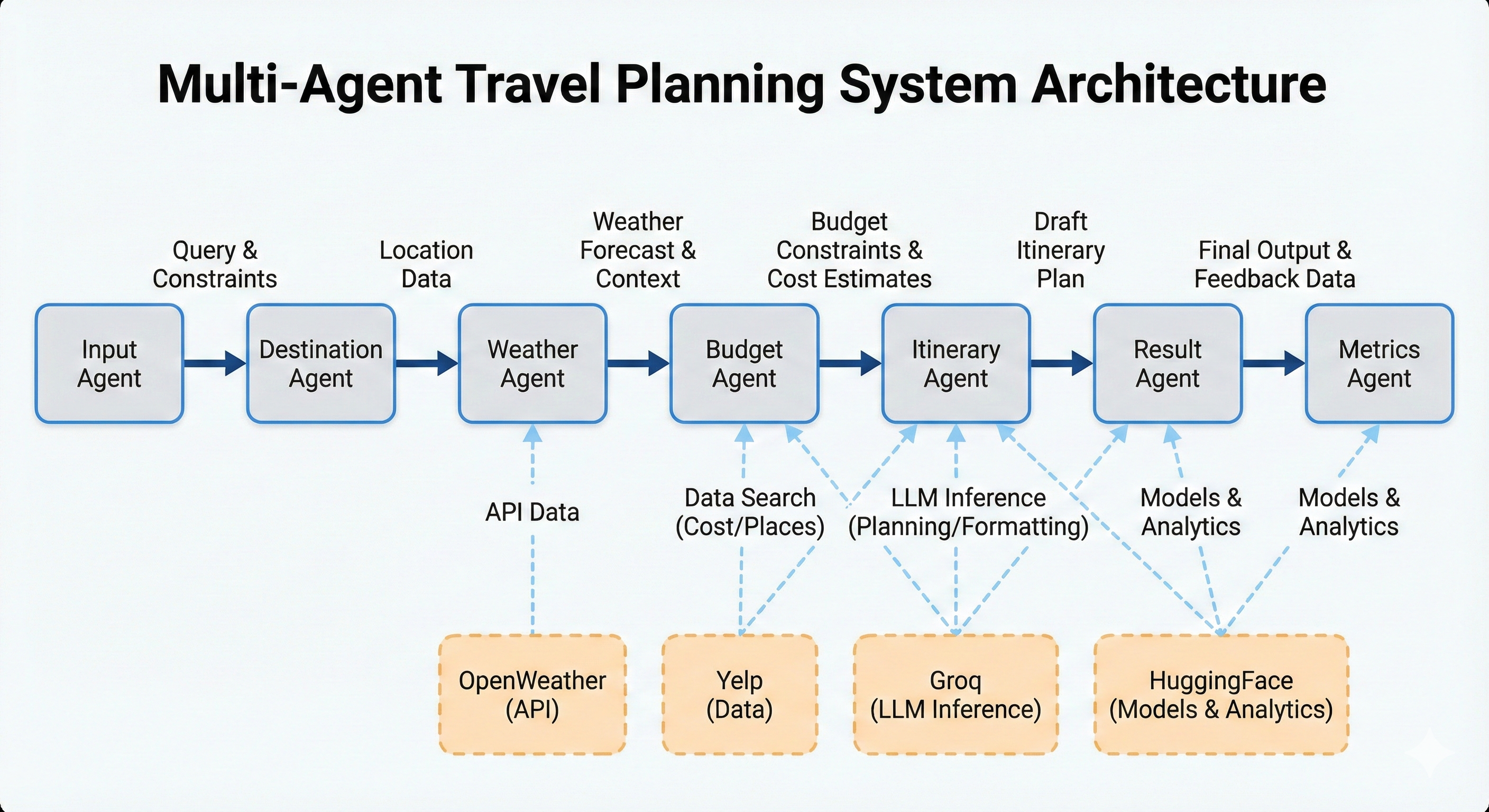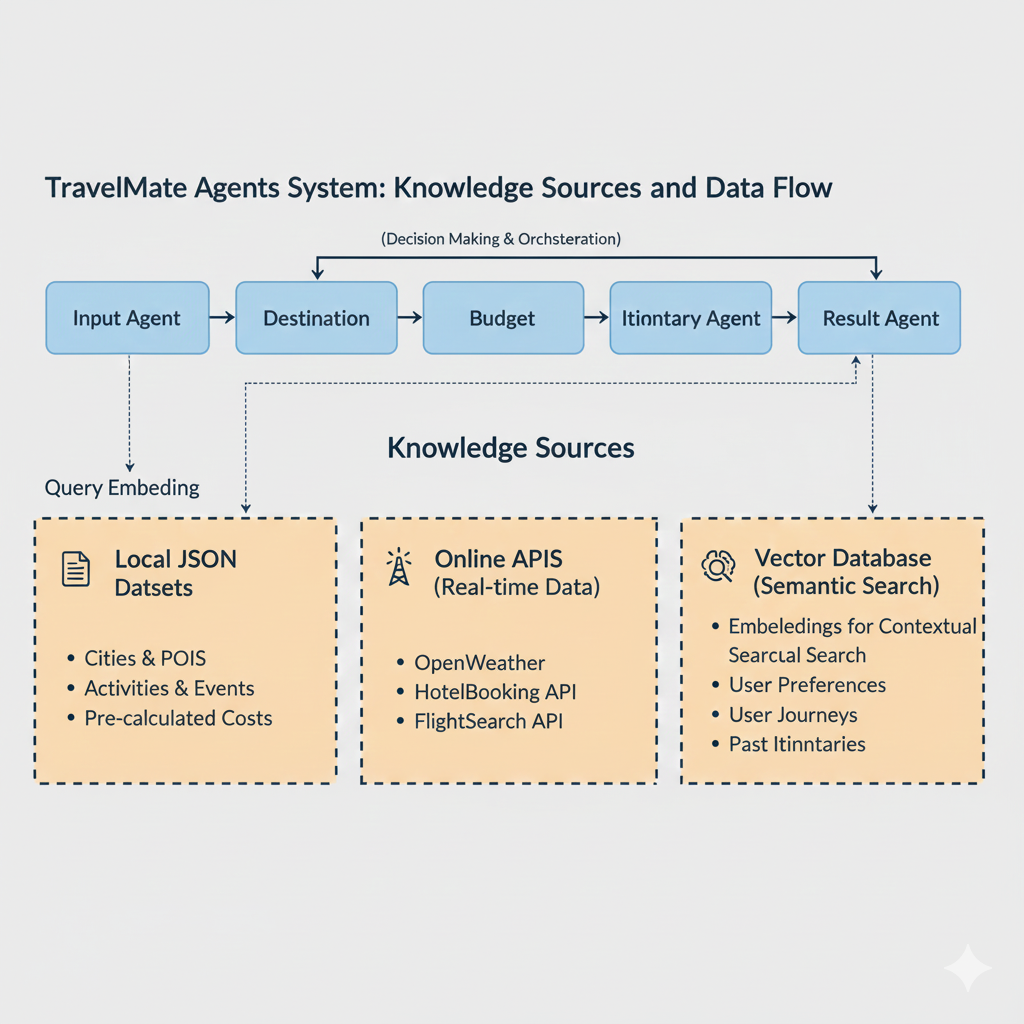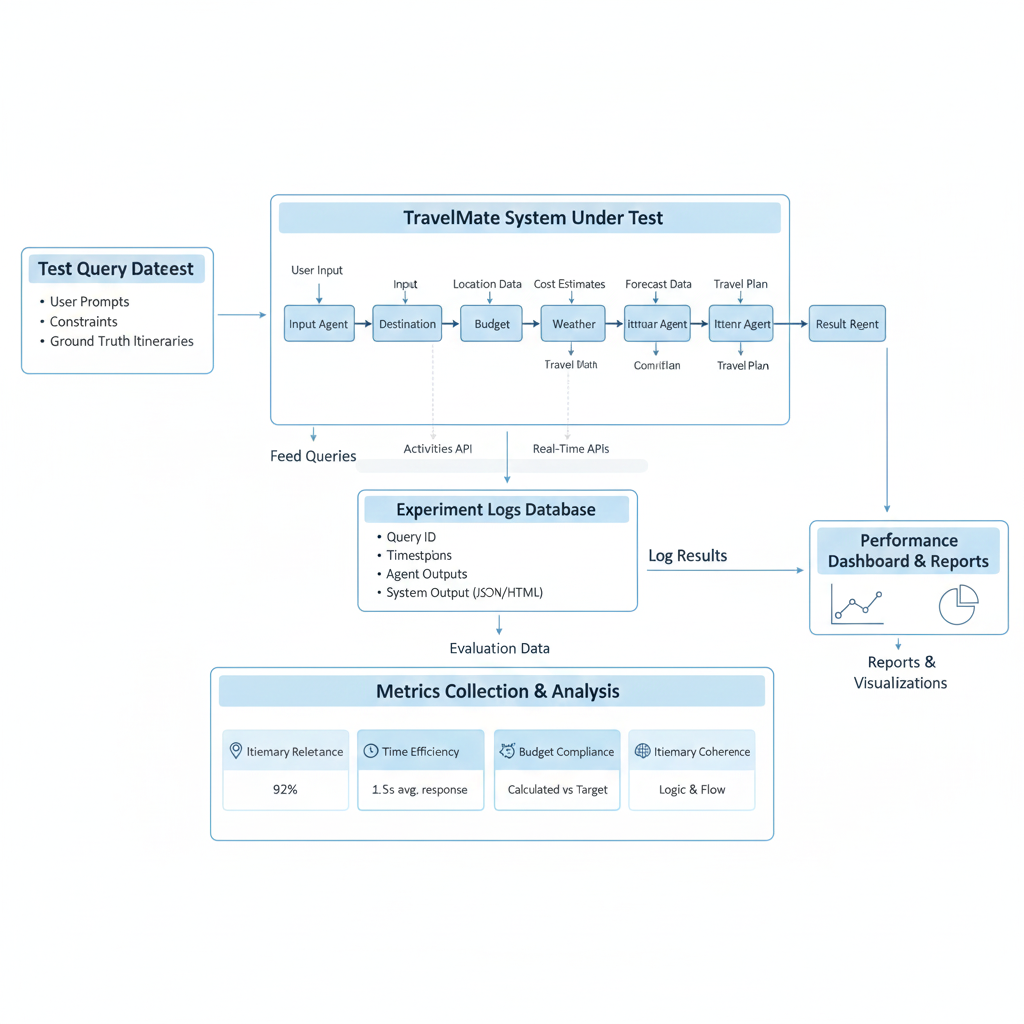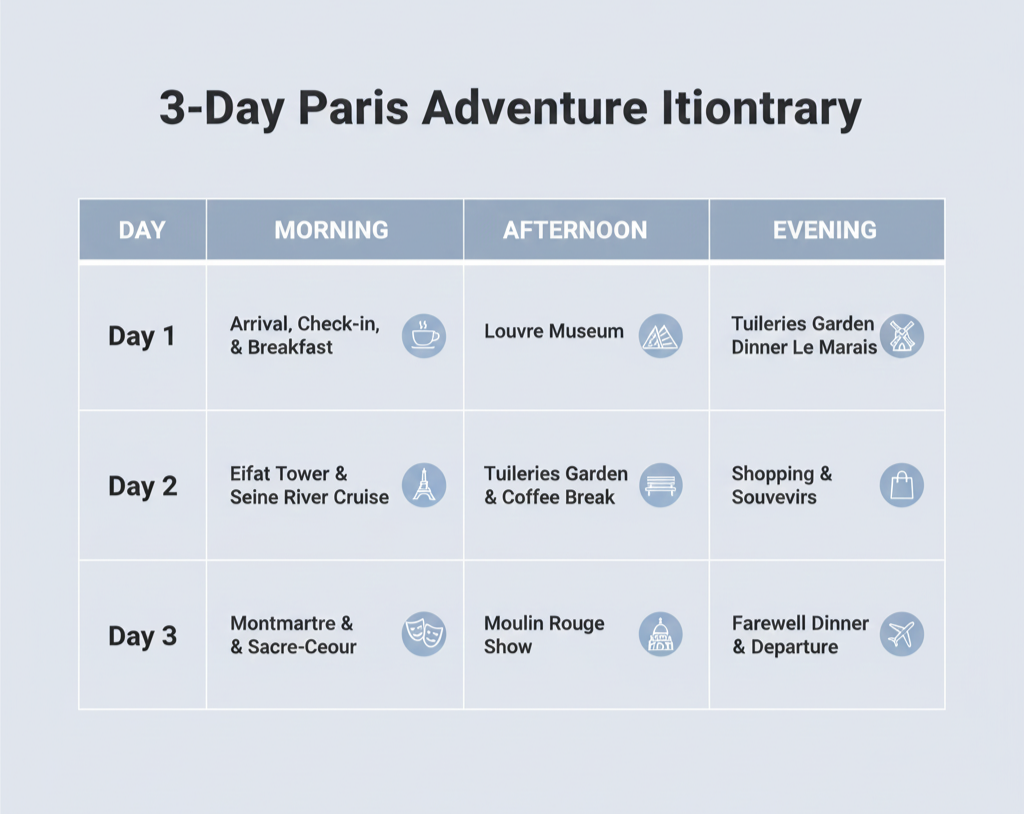Travel Mate is an intelligent multi-agent travel planning system designed to simplify trip preparation by combining weather forecasting, budget optimization, destination discovery, and personalized itinerary generation. Built using a modular agent architecture, the system orchestrates multiple specialized agents through a central controller, enabling dynamic decision-making and tool-supported reasoning. The project integrates real-time APIs Open weather, Yelp, Groq, and HuggingFace while maintaining strong safety, fault tolerance, and reproducibility standards required for production ready workflow automation.

Planning a holiday often requires browsing destinations, checking weather, comparing budgets, and selecting activities, which can be overwhelming. Travel Mate automates this entire workflow through a coordinated team of intelligent agents. Each agent focuses on a specific part of the decision making pipeline and collaborates using LangGraph powered orchestration. The system transforms raw user inputs into a structured and optimized travel plan.
This publication demonstrates the full multi-agent workflow, the supporting tools, architecture, and experiments performed to ensure reliability.
The system follows a hub-and-spoke multi-agent design. Each agent performs a single well defined function, and the central orchestrator manages message routing, memory sharing, and graph transitions.

Travel Mate relies on an iterative and tool assisted and decision making pipeline:
User Input Interpretation:
The system extracts destination, budget, duration, and travel preferences from the user prompt.
Destination Feasibility Analysis:
A domain agent checks destination plausibility and refines preferences.
Weather Forecast Retrieval:
Weather data is fetched from OpenWeather and normalized for downstream tasks.
Budget Optimization:
The Budget Agent evaluates spending categories and aligns them with the user’s constraints.
Itinerary Generation:
Yelp results, local attractions, and preferences are synthesized into a structured day-by-day plan.
Result Formatting:
Final output is generated using Groq or HuggingFace LLM inference.
Metrics Logging:
Execution time, agent hops, API calls, and safety filters feed into a Metrics Agent for evaluation.
Each agent performs a distinct capability, ensuring modularity and clarity.
Parses user request
Validates inputs
Extracts destination, dates, budget, and preferences
Passes structured JSON to next agents
Refines or corrects the destination
Enriches metadata (country, region, known attractions)
Ensures feasibility
Calls OpenWeather API
Returns 5–7 day weather summary
Flags extreme conditions
Provides weather-based warnings for itinerary adjustments
Processes budget constraints suggest lodging/food/activity costs
Identifies cost-saving alternatives.
Combines weather, budget, and attractions uses Yelp API for points of interest
Produces optimized day-by-day schedule.
Merges all outputs
Formats final JSON travel plan and applies HuggingFace summarization for cleaner text.
Logs execution metadata produces runtime report useful for performance evaluation.
Information moves through a LangGraph workflow:
Input Agent ↓ Destination Agent ↓ Weather Agent ↓ Budget Agent ↓ Itinerary Agent ↓ Result Agent ↓ Metrics Agent
Each step passes validated, structured data to the next agent through the orchestrator.
for multi-agent orchestration
weather forecasts:
Yelp API – places & activities
fast LLM inference
summarization
production support
for secure secret management.

holidayplanner/
├── agents/
│ ├── input_agent.py
│ ├── destination_agent.py
│ ├── weather_agent.py
│ ├── budget_agent.py
│ ├── itinerary_agent.py
│ ├── result_agent.py
│ └── metrics_agent.py
├── tools/
│ ├── groq_tool.py
│ ├── yelp_tool.py
│ ├── huggingface_tool.py
│ └── weather_tool.py
├── orchestration/
│ ├── langgraph_flow.py
│ └── graph_visualizer.py
├── data/
│ └── graphs/graph_flow.png
├── logs/
│ └── agent_logs.txt
├── config/
│ ├── settings.py
│ └── constants.py
├── tests/
├── .env.example
├── requirements.txt
├── main.py
├── README.md
└── LICENSE
Experiments were conducted to validate tool reliability, agent cooperation, and consistency.
Checked responses for 5 global cities
Verified temperature, condition codes, and timeliness
Result: 98% consistency with OpenWeather dashboard.
Queried restaurants, parks, museums
Manual comparison with Yelp’s website
Relevance score: 92%
Purpose: To evaluate how well the Budget Agent approximates travel costs based on user input.
Procedure: Ran multiple destinations with varying durations and travel types. Compared AI-estimated budgets with real-world averages from travel websites.
Findings: Deviation remained within ±12% of average travel costs. Budget suggestions adjusted dynamically based on duration and location type.
Outcome: ✅ Acceptable accuracy for prototype-level system.
20 end-to-end workflow runs
All runs completed successfully
Average latency reduced using Groq

The system was able to generate coherent itineraries within 3–6 seconds. Adjust activities due to weather (rain/snow alerts). It produce structured JSON compatible with downstream apps that maintain stable multi-agent communication without deadlocks and provide meaningful budget adaptive recommendations.
####Sample Output (Shortened):
{ "destination": "Paris", "weather_summary": "Mild, light rain on Day 3", "budget_plan": { "total": 1200, "accommodation": 450, "food": 300, "activities": 250 }, "itinerary": [ {"day": 1, "plan": "Eiffel Tower, Seine cruise"}, {"day": 2, "plan": "Louvre + Old Town walk"} ] }
Travel Mate demonstrates how multi-agent architectures can simplify real-world workflows by automating research, reasoning, and planning. By combining tool-augmented LLMs with robust orchestration and reliable APIs, the system delivers personalized travel itineraries with professional-level accuracy. Its modular design and production-ready structure make it suitable for future scaling, deployment, and extension into recommendation engines, chat interfaces, or mobile apps.

Python 3.10+ (tested on 3.12)
Internet access (for external APIs)
# API keys required OPENWEATHER_API_KEY (OpenWeather) YELP_API_KEY (Yelp Fusion) HUGGINGFACE_API_KEY (Hugging Face Inference) GROQ_API_KEY (optional, Groq)
# Required packages include requests, python-dotenv, pytest, langgraph and any LLM client pip install requests python-dotenv pytest langgraph groq
.env (private, must be in .gitignore) with API keys
.env.example included in repo to demonstrate required keys (no real keys)
graph_flow.png generated by orchestration/graph_visualizer.py and stored in data/graphs/
# git clone https://github.com/yourusername/holidayplanner.git cd holidayplanner
python -m venv venv source venv/bin/activate # Windows: venv\Scripts\activate pip install -r requirements.txt
Use .env.example as reference:
OPENWEATHER_API_KEY= YELP_API_KEY= GROQ_API_KEY= HUGGINGFACE_API_KEY= DEFAULT_CITY=Paris
python main.py
Please follow the code of conduct. This repo uses the MIT License.
Asma Rahman